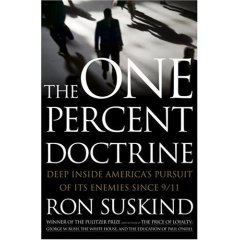We knew that Zubaydah had more information that could save innocent lives, but he stopped talking. As his questioning proceeded, it became clear that he had received training on how to resist interrogation. And so the CIA used an alternative set of procedures. . . I cannot describe the specific methods used -- I think you understand why -- if I did, it would help the terrorists learn how to resist questioning, and to keep information from us that we need to prevent new attacks on our country. But I can say the procedures were tough, and they were safe, and lawful, and necessary.In the One Percent Doctrine, Ron Suskind provides some detail on this "alternative set of procedures":
According to CIA sources, he was water-boarded, a technique in which a captive's face is covered with a towel as water is poured atop, creating the sensation of drowning. He was beaten, though not in a way to worsen his injuries. He was repeatedly threatened, and made certain of his impending death. His medication was withheld. He was bombarded with deafening, continuous noise and harsh lights.In other words, torture.
Well, guess what? It wasn't the torture that got him talking again:
Then there was a small break. A CIA interrogator, according to sources who monitored the program, was skilled in the nuances of the Koran, and slipped under Zubaydah's skin. The al Qaeda operative believed in certain ideas of predestination -- that things happen for reasons preordained. The interrogator worked this, pulling freely from the Koran. Zubaydah believed he had survived the attacks in Faisalabad, when several of his colleagues were killed, for a purpose. He was convinced that that purpose, in the fullness of time, was to offer some cooperation to his captors, something a dead man couldn't do.After which, he identified both Jose Padilla (The Alleged Dirty Bomber) and KSM (The Alleged 9-11 "Mastermind").
 Bush says AZ gave up KSM before he was tortured, then clammed up, then was tortured and gave up more info. Suskind says the sequence was torture first, with nothing to show for it, then the Koran gambit, resulting in the ID of KSM. At least, that's what it looks like to me. It's a little bit difficult to follow. There is about one percent agreement between Bush and Suskind. Again, I ask, who are you gonna believe?
Bush says AZ gave up KSM before he was tortured, then clammed up, then was tortured and gave up more info. Suskind says the sequence was torture first, with nothing to show for it, then the Koran gambit, resulting in the ID of KSM. At least, that's what it looks like to me. It's a little bit difficult to follow. There is about one percent agreement between Bush and Suskind. Again, I ask, who are you gonna believe?Anyway, Suskind quotes CIA officers asking the key question: Did the torture make AZ more or less susceptible to the psychological play that got him talking? We'll never know.
One thing that puzzles me after reading this book and this article is whether other, more experienced countries were consulted on the great riddle of whether to torture our prisoners. I mean, our two closest allies are Israel and the U.K., both of which have decades of experience with dedicated, hardcore political terrorist groups operating inside their borders, complete with fanatical operatives trained to resist interrogation techniques. Spain, too. Farther afield, there are less savory regimes such as Egypt and Saudi Arabia that have surely considered the issue, to say the least. Were any of them consulted? If they were, I never heard about it, not even in Suskind's book.

No comments:
Post a Comment